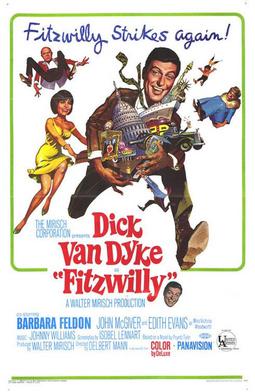It can be weird seeing a star you know in a film you're just not expecting. I grew up watching Dick Van Dyke in his classic 1960s sitcom The Dick Van Dyke Show so while I know he's done plenty of movies, I picture him in the sitcom, not the movies. Well, that don't mean I won't give it a shot, and in the case of 1967's Fitzwilly, I'm certainly glad I did.
As long as he can remember, Claude Fitzwilliam (Van Dyke) has been the head butler for a rich, old widow, Miss Victoria Woodworth (Edith Evans). The problem though is simple; Miss Woodworth -- ever the lady -- isn't rich, but she doesn't know it. How does she maintain her lifestyle then? Well, she lives a somewhat luxurious lifestyle, but she's also generous, very generous, with her donations to charity. In steps Fitzwilly, a highly intelligent, very clever man who has organized Miss Woodworth's staff into quite the crew of con artists and thieves. Their goal is far from selfish though. They steal, bamboozle and con their way into all sorts of money, but always from insurance companies. There's a problem though. Miss Woodworth has hired a new secretary, Juliet Nowell (Barbara Feldon), who seems nosy and might just stumble into Fitzwilly and crew's operation.What to do, what to do?
One word came to mind while watching this comedy from director Delbert Mann, and that is simply...charming. It isn't anything dirty (in the least), obvious, stupid or even physical. The laughs are almost all under-played, focusing more on a line delivery or a reaction from a very talented and deep cast at said line. I've written this before about 1960s comedies, and I'd like to think it certainly applies here. It's almost a last age of innocence when it comes to big screen comedies. They don't try too hard, are content to be entertaining without being offensive, and offer plenty of good, old-fashioned laughs. Just sit back and enjoy it. You shan't be disappointed.
Much of that charm comes from star Dick Van Dyke, and it's fun to see him out of a role I so closely associate him with, his classic sitcom. Sidenote: Yes, I've seen Mary Poppins so I have in fact seen him in other parts, but you know what I mean. It's far from a typical part for Van Dyke. He's a great comedic actor, but more than anything else, he's a great physical comedian, moving around effortlessly. Playing gentlemanly Claude, he doesn't get a chance to be a physical presence. Instead, it allows him to breathe in a quieter, more subtle part that still allows for plenty of laughs. He also has a great chemistry with co-star Barbara Feldon (also a TV star on Get Smart) who arrives on scene to cause some trouble, not knowing what's she gotten herself into. They start off as rivals -- both suspicious of the other -- and not surprisingly end up dealing with a mutual attraction. Obvious? Yes, but it's enjoyable throughout.
What I loved as much as Van Dyke and Feldon though was the supporting cast. A huge name on the stage in England, Evans is a scene-stealer as a not-so-rich old widow who nonetheless thinks she's rich and keeps donating money to charity after charity. Her scenes with Van Dyke and Feldon are perfection in their subtlety. And then there's Fitzwilly's crew of amateur crooks turned highly successful crooks with intricate plans and know-how. There are double-digit members of the crew, but some stand out more than others, none more than John McGiver as Albert, a longtime pickpocket struggling with the morality of what he's done. Also look for Noam Pitlik, a very young Sam Waterston, Anne Seymour, Nelson Olmsted, and Paul Reed. Also worth mentioning are John Fielder and Norman Fell as a dupes of separate Fitzwilly cons, and Harry Townes as Mr. Nowell, Juliet's father.
The script gives the deep cast a chance to show off, much of that coming in a series of reveals of how Fitzwilly and Co. pull their cons off in a variety of different and unique ways. The highlight though is the finale, the crew robbing a Gimbels Department store on Christmas Eve as hundreds of shoppers do their last-minute shopping. Fitzwilly has countless little touches to cause mass chaos, giving him a chance to convince Fell's security official to simply give him the money. One of many highlights? Albert Carrier's Pierre walking around pinching countless women's butts, setting off a domino effect of slaps to innocent men. It's a gem of an ending, the final scene providing some good, funny and story-appropriate twists.
I liked this one a lot. It benefits from some 1967 on-location shooting in New York City and a solid score from a young composer, John Williams, who would go on to be a halfway decent composer for some other movies. It's funny from the start with Van Dyke, Feldon and Evans leading the way. Well worth tracking down a copy. I had good luck with the TCM print so keep an eye out for the monthly schedule.
Fitzwilly (1967): ***/****


No comments:
Post a Comment